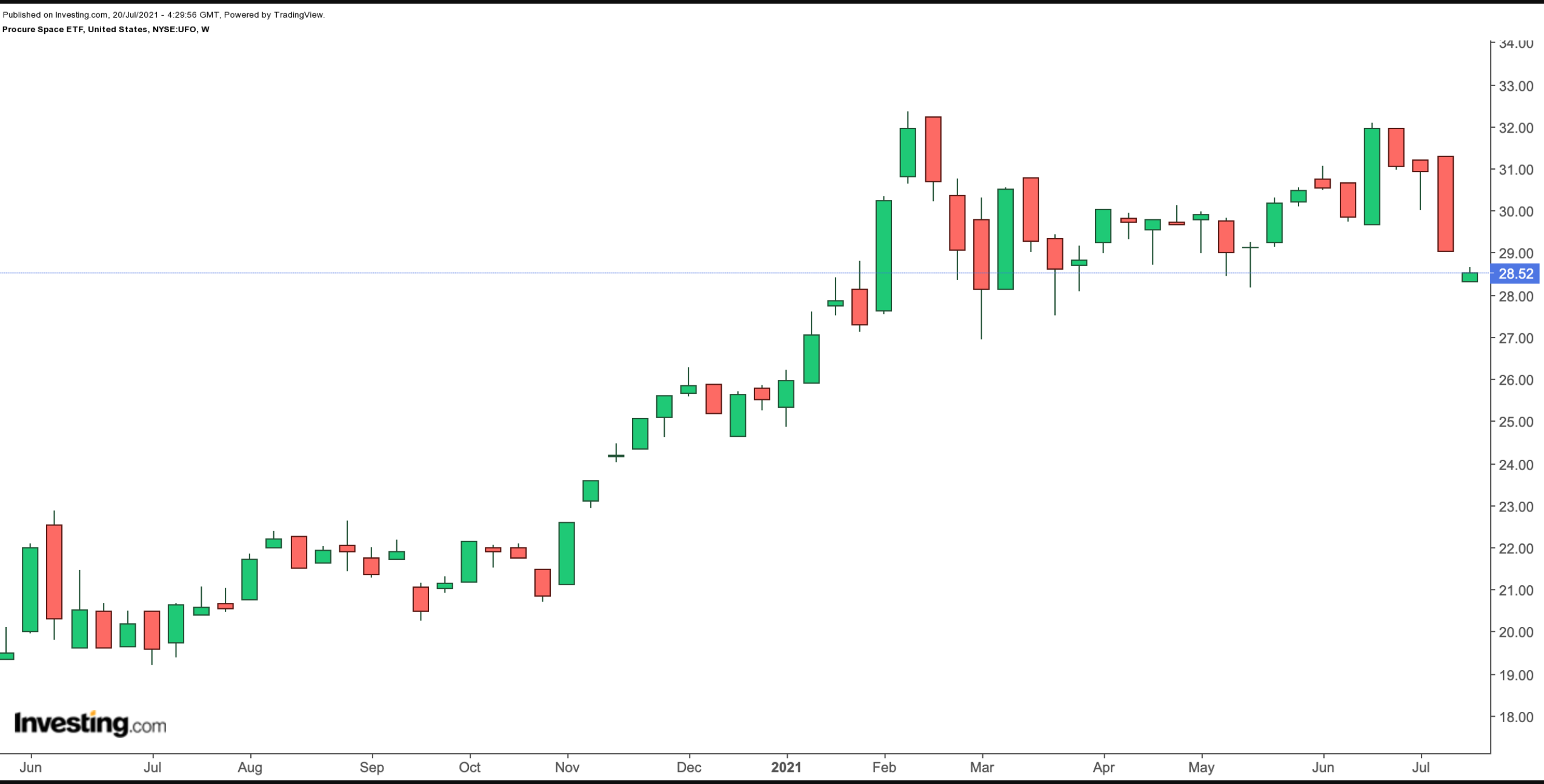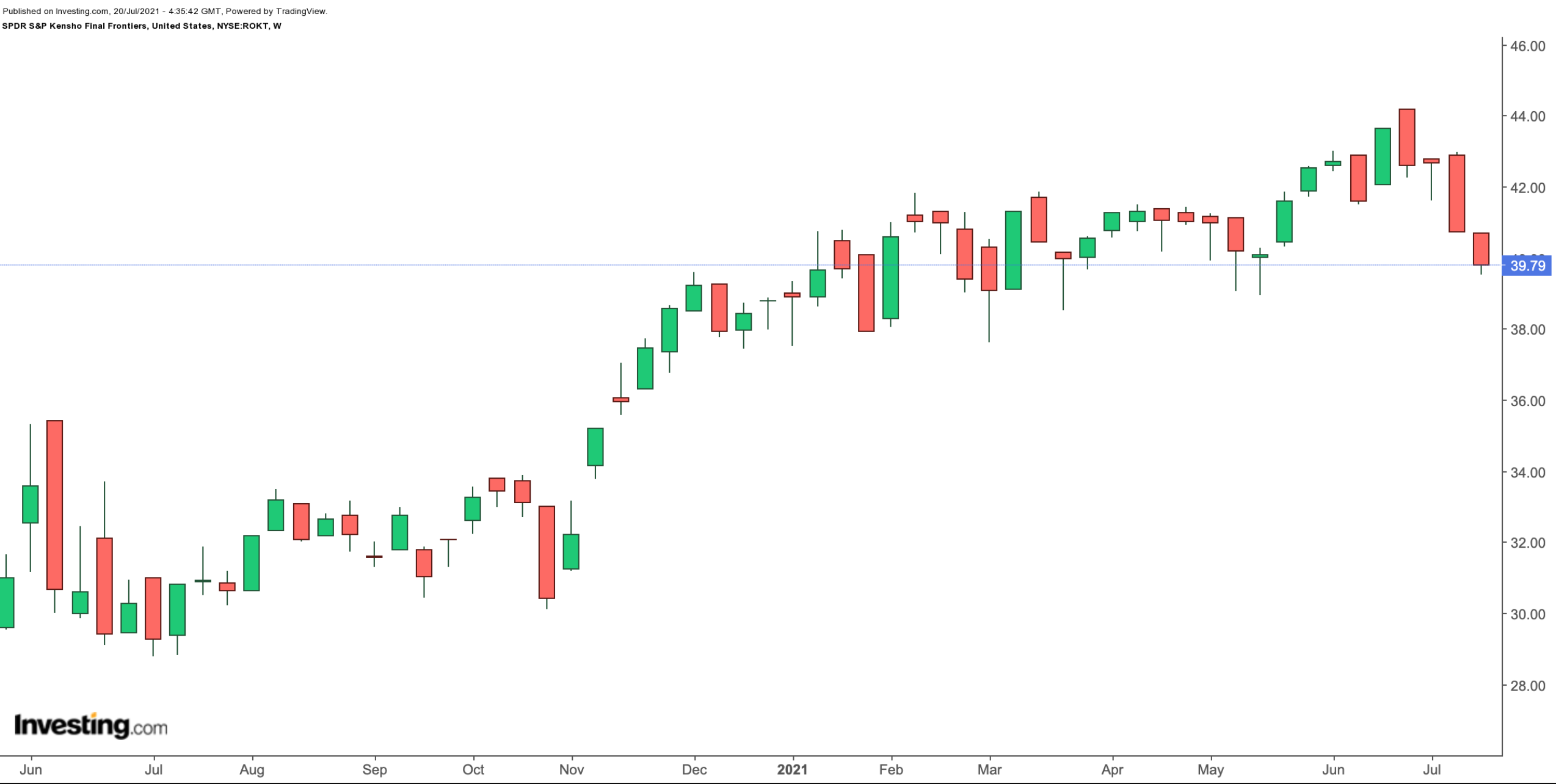The "billionaire space race" is on, according to recent news headlines. On July 11, Sir Richard Branson, founder of Virgin Galactic (NYSE:SPCE), travelled to space aboard the spacecraft VSS Unity. And today, the world's richest man will attempt the same. Blue Origin, which is fully funded by former Amazon (NASDAQ:AMZN) CEO Jeff Bezos, is launching the billionaire and three other passengers into space.
Branson, who previously founded Virgin Atlantic Airways, which is owned in part by Delta Air Lines (NYSE:DAL), moved into the space sector in 2004 when he founded Virgin Galactic, which defines itself as “the world’s first commercial spaceline.” The company went public via a reverse merger with a special purpose acquisition company (SPAC) in October 2019 at an opening price of $12.34. In early February, SPCE stock saw a record high of $62.80. Now, the shares are hovering around $30.
Tesla (NASDAQ:TSLA) founder, Elon Musk's SpaceX also has lofty galactic ambitions. SpaceX is aiming to land the first humans on Mars by 2024 and is now collaborating with NASA on various projects.
Each of these three companies have different structures, business models and financing approaches to commercial space exploration.
Most of us will not be able to go to space in our lifetimes. However, for investors, there are exchange-traded funds (ETFs) that give exposure to companies that are working on space technologies. Today, we discuss two of those funds.
1. Procure Space ETF
Current Price: $28.52
52-Week Range: $20.26- $32.40
Expense Ratio: 0.75% per year
Dividend Yield: 1.62%
The Procure Space ETF (NYSE:UFO) provides access to businesses involved in space-related industries. The fund started trading in April 2019.

UFO, which has 35 holdings, tracks the returns of the S-Network Space Index. Around three-quarters of the businesses are US-based. The rest come from France (5.58%), Canada (4.98%), Luxembourg (4.36%), Japan (3.99%) and several other countries.
In terms of the sub-sectoral breakdown, the communication services sector comprises the biggest slice, with 44.30%; followed by the industrials and information technology sectors, with 32.67% and 15.07%, respectively. The fund’s top 10 holding account for almost half of the net assets of $122.4 million.
Among the leading names in the fund are the communications services group Dish Network (NASDAQ:DISH); Trimble (NASDAQ:TRMB), which has progressed from a GPS company to an integrated work process platform focusing on positioning technology; Globalstar (NYSE:GSAT), which provides mobile satellite services; Maxar Technologies (NYSE:MAXR), which has built the robotic arms on NASA’s Perseverance rover that has been exploring the surface of Mars; and Canada-based space technology group MDA (TSX:MDA).
Over the past year, UFO is up 38% and returned 12% so far this year. The fund hit an all-time high in February. Those investors who would like to be part of the new space race should keep the fund on their radar screen.
2. SPDR S&P Kensho Final Frontiers ETF
Current Price: $39.79
52-Week Range: $30.10 - $44.18
Dividend Yield: 1.84%
Expense Ratio: 0.45% per year
The SPDR S&P Kensho Final Frontiers (NYSE:ROKT) invests in companies that focus on the exploration of outer space and the deep sea. The ETF started trading in October 2018. It is a small fund with about $22.13 million in assets.

ROKT, which has 35 holdings, follows the S&P Kensho Final Frontiers Index. In terms of the sub-sectoral breakdown, the aerospace and defence segment makes up the highest portion, with 55.07%. Next in line are alternative carriers (7.78%), and research and consulting services (7.41%). The fund’s top 10 holdings account for close to 40% of the fund.
Teledyne Technologies (NYSE:TDY), which focuses on instrumentation and digital imaging; defence group L3Harris Technologies (NYSE:LHX); Honeywell International (NASDAQ:HON), whose largest business segment is aerospace; industrial Internet of Things (IoT) specialist ORBCOMM (NASDAQ:ORBC); and aerospace company Aerojet Rocketdyne Holdings (NYSE:AJRD) lead the names in the roster.
In the past 12 months ROKT is up more than 28%. It saw an all-time high in late June. Investors who want to include an ETF that is heavily tilted toward aerospace and defense names should research the fund further. A potential decline toward $37 would improve the margin of safety.
On a final note, interested readers might also want to do due diligence on the ARK Space Exploration & Innovation ETF (NYSE:ARKX), an actively-managed fund run by Cathie Wood's ARK Invest. It was listed in March 2021, and net assets stand at $627 million. Since inception, ARKX is down about 3%.
